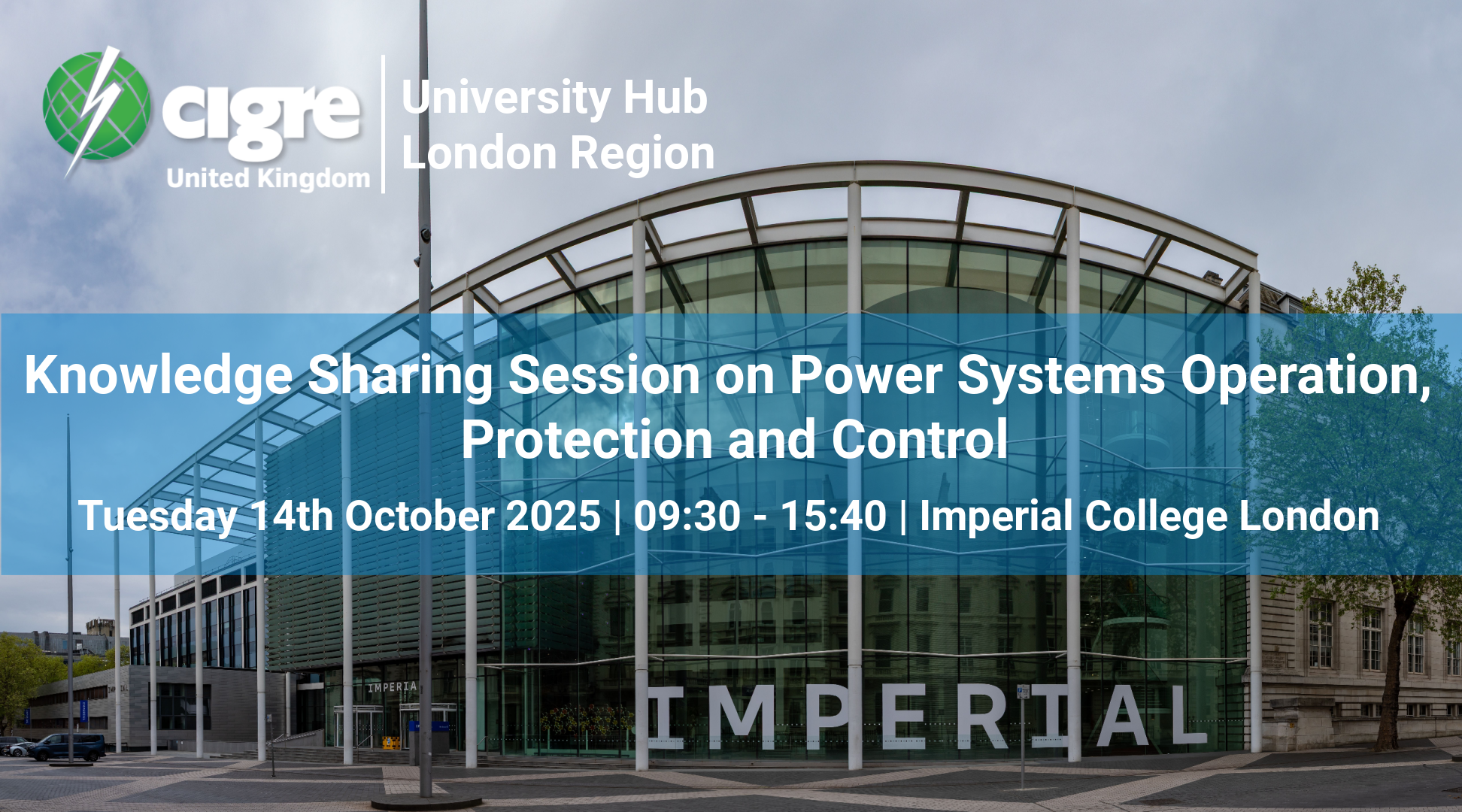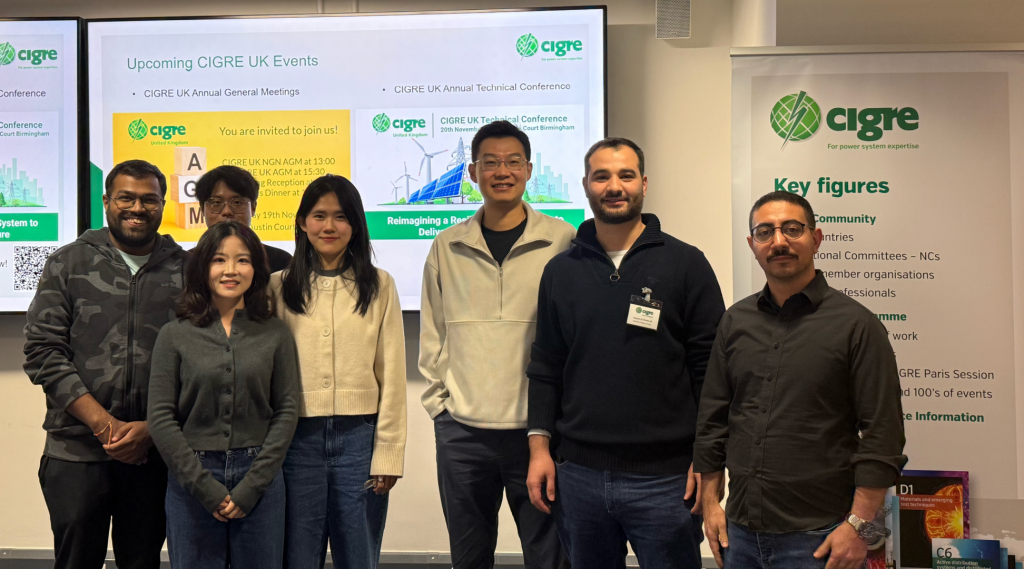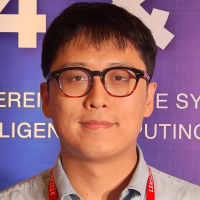
CIGRE UK University Hub – London Region convened a focused knowledge-sharing day on Power Systems Operation, Protection & Control, hosted at Imperial College London.
Across technical talks and a lively panel, three themes stood out:
- IBR control & stability in converter-rich grids
- Protection & control strategies for low-inertia systems
- Markets, flexibility & economics shaping real-world deployment
A big thank-you to our speakers and attendees for the sharp questions and open discussion. We’re excited to keep this conversation going across the CIGRE community.


Session 1 | Future of Power System Control and Stability

AC Capacitor Dynamics-Based Synchronous Control for Grid-Following Operations
The growth of renewable energy generation drives an increase in power inverter integration. Grid-following inverters remain the mainstream solution for renewable energy connection due to their operational efficiency and superior compatibility with existing grid infrastructure. However, their reliance on phase-locked loops leads to implicit synchronous inertia and damping, challenging parameter design and system stability. This paper proposes a phase-locked loop-free control strategy that enables explicit and tunable synchronous characteristics for grid-following inverters. The method achieves grid synchronization via ac capacitor dynamics without relying on active power, thereby preserving the energy conversion advantages of the grid-following mode. Further analysis reveals that inverters synchronized via reactive power inherently exhibit grid-following rather than grid-forming behavior. Lastly, an intuitive analytical model is developed to assess the stability, with experiments and simulations validating the proposed method.
Biography
Zehua Tang received the B.Eng. and M.Phil. degrees in electrical engineering, China University of Mining & Technology, Xuzhou, China, in 2019 and 2022, respectively. He is currently working toward a Ph.D. degree with the Department of Engineering, King’s College London, London, U.K. His major field of study is the control, modeling, and analysis of high-proportioned power electronics-penetrated ac power systems.

Optimal Dynamic Voltage Support Using Grid Forming Inverters
This presentation introduces an optimal control strategy for Grid-Forming inverters to enhance dynamic voltage support (DVS) during grid faults, even under current limitations. Different current limitation methods are compared, and results show that the proposed optimal dynamic voltage support (oDVS) achieves superior performance—maximizing voltage support at the PCC and maintaining optimal phase angle, ensuring effective LVRT capability.
Biography
Andreas Nikolaou is a Power Systems Engineer at Blake Clough Consulting with a PhD from Imperial College London. His PhD research focused on the dynamic operation of Grid-Forming inverters under saturation conditions, where he developed innovative control strategies for optimal fault current contribution and voltage support. At Blake Clough, Andreas applies this expertise across a wide range of power system studies, supporting projects related to stability.

Hydropower for the Age of Deep-Decarbonization: a Case Study of the Brazilian Water-Energy Nexus
Hydropower is regarded as a key source of electricity in the era of deep decarbonization. With the increasing deployment of variable renewable energy sources, hydropower is expected to play an integral role in enhancing grid stability and flexibility. At the same time, water resource management remains an equally critical challenge. In particular, reservoir-based hydropower requires carefully designed practices to balance electricity generation with downstream water allocation.
This research examines the case of Brazil, one of the world’s most hydropower-dependent countries. Brazil is recognized for its participatory and decentralized governance, which facilitates intersectoral discussions, including water and energy sectors. However, under conditions of severe water stress, governance has become fragmented, and the overprioritization of the energy sector has undermined downstream water resource management. This study presents the results of a hydrologic-resolution analysis, highlighting the nationwide institutional fragmentation observed across federal hydropower-dominant river basins.
Biography
Kanta Nishikura is an MPhil/PhD student at the UCL Energy Institute. His research interests focus on leveraging the integration of distributed energy resources (DERs) into various areas, including energy system resilience, local economic growth, and decarbonization. His expertise lies in energy system modeling, grounded in operations research methods and multi-agent simulation.

Electrochemical Modelling and Experimental Validation of Proton Exchange Membrane Water Electrolysers for Loss Decomposition and Techno-Economic Assessment
Hydrogen technologies are increasingly recognized as a key component of the global energy transition. Among them, proton exchange membrane water electrolysers (PEMWEs) offer a pathway for clean hydrogen production, but important questions remain about their performance, efficiency, and overall economic viability. This presentation outlines a general research effort that combines modelling and experimental perspectives to better understand PEMWEs.
Biography
Haotian (Tianyi) Ma is a Ph.D. candidate at University College London’s Bartlett Energy Institute, specializing in data-driven multiscale modelling and optimization of electrochemical energy storage systems. His research integrates lithium-ion batteries, supercapacitors, and proton exchange membrane (PEM) water electrolysers to enhance data centre resilience, hydrogen production, and low-carbon energy systems. He previously worked at the Huawei European Research Institute, where he developed COMSOL- and PyBaMM-based models for fast-charging strategies, ESG-aligned asset valuation, and carbon trading integration. Earlier, at the Global Energy Interconnection Research Institute, he designed dynamic PEM electrolyser models and optimized catalysts for EU decarbonization frameworks. Ma’s work bridges computational modelling, experimental validation, and machine learning, with publications in Applied Energy, IEEE, and the International Journal of Greenhouse Gas Control. He holds degrees from Southeast University, the University of Nottingham, and the University of Warwick, and brings expertise spanning energy systems engineering, ESG risk analytics, and sustainable infrastructure design.
Session 2 | Power System Protection

Challenges of Fault Current Analysis using IEC 60909 and ENA G74 in Grids Dominated by Converter Fed Generation
Fault current analysis is a key part of designing, managing and analysing an electrical network. The traditional IEC 60909 calculation method has been well established in standards for many decades, however it is based on a number of simplified assumptions to make the computational process simple and efficient. A comparison is also included with the ENA G74 short circuit calculation method. The assumptions used in these methods are creating misleading results in large renewable energy generation plants that have a significant portion of Converter Fed Generation (CFG), by overstating the retained voltages and increasing the calculated fault levels. This paper shows how these assumptions break down in generation sites dominated by CFG, and can produce unrealistic results, due to the constant current output of the CFG. The paper also outlines some of the shortfalls in assessment of Grid Forming Inverters fault contribution.
Biography
Stephen Sommerville is the Managing Director of Aurora Power Consulting, and a part time PhD student at Brunel University London. He has been involved in power system analysis for nearly 25 years, and has worked across a wide range of industries and sectors.
His PhD research is aimed at understanding the constraints and challenges of large scale IBR deployment with a national power system and the challenges faced in maintain grid stability and security. In his role at Aurora Power he has undertake a wide range of RMS and EMT based simulations and analysis for for large and complex renewable energy sites.

Protection Challenges and Solutions for Power Grids dominated by Inverter-based Sources
Numerous renewable energy sources (RESs) have been coupled with the modern power grid for environmental protection, so the grid is gradually changing from synchronous generator (SGs) dominated to power electronics dominated. The RES power plant is an important way to utilize renewable energy, especially for wind-rich or solar-rich areas, and the generated electricity is often transmitted to a far end by sub-transmission or transmission lines. These transitions will bring new challenges for transmission network protection because of their very different fault signatures such as the limited current, frequency offset, and variable sequence impedance angles. Therefore, some effective solutions must be proposed to ensure the protection reliability.
Biography
Zhe Yang received the B.S. degrees in electrical engineering from Northeast Electric Power University, Jilin, China, in 2017 and and M.S. degree in electrical engineering from North China Electric Power University, Beijing, China, 2020, respectively. He obtained his Ph.D. degree in electrical engineering from Aalborg University, Aalborg, Denmark, in 2023. He worked as a Postdoctoral Researcher with the Hong Kong Polytechnic University, Hong Kong from September 2023 to September 2024. Also, he was a visiting student at TU Delft in 2022 and the University of Toronto in 2019. He is currently a UKRI Postdoctoral Fellow at Imperial College London, London, UK. His research interests include fault analysis and protection for renewable power systems.

Biography
Fater Akuhwa is currently working in the Control and Power research group at Imperial College London on a high-impact project. His research is related to system services for a 100% renewable electricity grid and cuts across the technical aspects of inverter designs, the redefinition of power grid system services under a high-penetration of inverter-based resources, and the policy aspect which involves incentivizing market players to act in a way that will achieve cost optimization.
Session 3 | Markets, Flexibility & Economics

Integrating Grid-Forming and Grid-Following Battery Energy Storage Systems into Power Markets
The global power sector is undergoing a profound transformation as renewable generation accelerates and conventional synchronous plants retire. Battery Energy Storage Systems (BESS), once primarily valued for flexibility services such as frequency regulation, energy arbitrage, and congestion relief, are now evolving into grid-forming resources that actively shape and stabilize modern power systems. This presentation explores the market products and services offered by both grid-following and grid-forming BESS. Grid-following systems are already proven in applications such as energy arbitrage, frequency regulation, capacity markets, and congestion management. Grid-forming systems expand these capabilities by enabling black-start services, inertia provision, system strength, and microgrid support — functions that are critical as synchronous generation declines.
Biography
Konstantinos Afentoulis is a Senior Algorithms Operations Scientist at the National Energy System Operator (NESO), specialising in optimisation and algorithmic solutions for electricity system balancing. Konstantinos holds an MEng in Electrical and Computer Engineering and is completing a PhD on the optimal participation of dispatchable loads in balancing markets to enhance renewable integration. With over six years of professional experience across consultancy, research, and system operations, he has led projects on flexibility integration, optimisation, and energy market participation for VPPs, BESS, and demand response. Konstantinos has contributed to leading energy consultancies such as Baringa and AFRY, where he developed advanced electricity market dispatch models for the UK and EU, supporting major investors in decision-making and system operators in policy and operational assessments.

Optimal allocation of energy storage in the GB grid for renewable curtailment reduction through open-source software development
The rapid integration of renewable energy sources (RES) into Great Britain’s (GB) electricity grid has led to increasing levels of curtailment, driven by infrastructure constraints and the intermittent nature of resources such as wind and solar. Energy storage systems offer a promising solution to mitigate curtailment by absorbing excess generation and releasing it during periods of high demand. This study presents a comprehensive open-source modelling framework, developed using the PyPSA library, to investigate the optimal utilisation of energy storage in the future GB transmission grid. The model incorporates high-resolution demand and renewable generation data and applies advanced optimisation techniques while accounting for system constraints such as transmission line capacity, generator limits, and marginal costs. Preliminary results indicate that strategically locating storage near major renewable generation sites—particularly in Scotland—can significantly reduce curtailment and improve the efficiency and reliability of the GB grid.
Biography
Dr. Sobhan Naderian is a postdoctoral research fellow at Brunel University London, specializing in energy systems modelling, optimization, and socio-economic analysis for sustainable transitions. He holds a PhD in Electric Power Engineering, where his doctoral work focused on advanced signal processing and machine learning techniques for power quality event detection and classification. His research spans multiple international projects, including the H2020 ENCLUDE project on inclusive decarbonization, the Street2Grid blockchain platform for peer-to-peer energy trading, and the EPSRC DIGEST project on the carbon impacts of energy storage deployment. Dr. Naderian is proficient in Python, MATLAB, machine learning frameworks, and generative AI, with applications in grid modelling, socio-demographic clustering, and renewable integration. He has published widely in peer-reviewed journals and conferences and has also contributed to patents and applied software development. His interdisciplinary expertise bridges engineering, sustainability, and data science to deliver innovative solutions for low-carbon, resilient energy systems.

The Role of Tidal Stream Energy in Achieving the UK’s Net Zero 2050 Goals
Tidal stream energy is a highly predictable and reliable renewable resource that can play a pivotal role in supporting the UK’s transition to Net Zero by 2050. While wind and solar are currently leading the renewable generation mix, tidal offers unique advantages as a technology, contributing to system stability. Our research explores the potential role of tidal stream generation in achieving Net Zero, with a particular focus on optimisation of generator allocation and the implications for power system operation. By linking different types of advanced techniques, this research provides a holistic view of tidal energy’s role for a future decarbonisation of the system. The insights aim to propose data-driven decisions for policymakers, investors, and system planners, emphasising tidal energy’s capacity to become a valuable part of the UK’s renewable portfolio and to make a meaningful contribution towards meeting the 2050 Net Zero targets.
Biography
Daniil Hulak is a Research Fellow at the Brunel Interdisciplinary Power Systems (BIPS) Research Centre, Brunel University of London. His research focuses on renewable energy integration, forecasting, and Net Zero-aligned system planning. Before moving to the UK, he worked in the Ukrainian energy industry, experience covering various aspects of the distribution operator’s work, including electricity market design and liberalisation, tariff policies, distribution system development, and resilience. At present, Danii is contributing to a project on tidal energy resource assessment, where he combines optimisation techniques with power system simulations to evaluate how tidal energy can be effectively integrated into the UK electricity grid.

Decentralized Intelligent Multi-party Competitive Aggregation Framework for Electricity Prosumers
Distributed energy resources and IoT connectivity are turning passive consumers into active prosumers and shifting distribution grids to bidirectional power flows. In this context, aggregators emerge as key intermediaries, yet competition among multiple aggregators, and their interactions with heterogeneous prosumers, remains complex and dynamic. This talk presents a decentralized, privacy-preserving aggregation framework that models these interactions as a multi-leader–multi-follower (MLMFG) game. We implement decision-making at the edge, avoiding centralized data collection and enabling scalable coordination. The core algorithm is a graph-based consensus method that allows aggregators and prosumers to exchange trading information. We provide mathematical guarantees: existence and uniqueness of the game solution, along with a proof of linear convergence for the proposed solver. Using an open-source dataset, we demonstrate practical applicability and report lower communication complexity compared to benchmark approaches. The framework offers a principled path to integrate DERs, such as storage and EVs, into competitive markets while respecting privacy and reducing coordination costs, supporting reliable, low-carbon operation of future distribution systems.
Biography
Ruiqiu Yao is an Associate Lecturer in Energy Infrastructure Systems at University College London (UCL). His research lies at the frontier of decision-making in low-carbon energy systems, with particular interest in distributed optimisation, coordination of flexible assets, and prosumer participation. He develops models and algorithms for planning and operating multi-energy networks, focusing on scalability, interoperability, and real-world applicability. Yao’s work has appeared in Applied Energy and the International Journal of Energy Storage, among others. Broadly, his goal is to bridge optimisation with policy-relevant insights so that system operators and stakeholders can integrate renewables while maintaining reliability and affordability. He is particularly interested in decision-support tools that enable participatory planning and transparent trade-offs between cost, environmental impacts, and efficiency across energy vectors at various scale.
